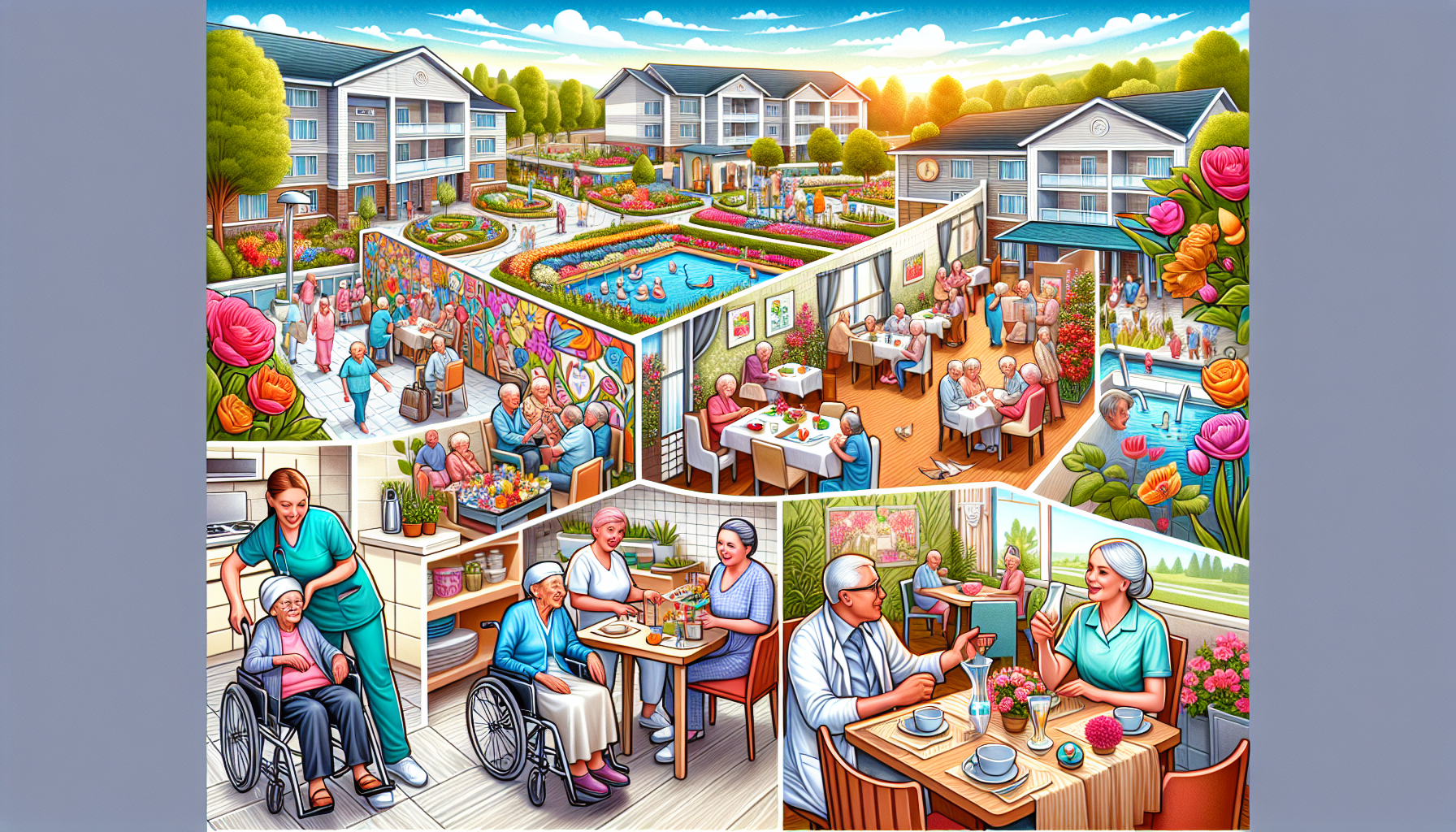
Assisted Living Facilities vs Nursing Home: Choosing the Right Care for Your Loved One
Choosing between assisted living facilities and nursing homes is crucial for your loved one’s care. This guide will clarify the differences in care levels, services, and costs to help you make an informed decision.
Key Takeaways
- Assisted living facilities promote independence among seniors by providing support with daily self-care activities, while nursing homes focus on extensive medical care and 24-hour supervision for residents with complex health needs.
- The average monthly cost for assisted living is approximately $5,350, compared to $9,733 for nursing homes, reflecting the differences in the level of care and services provided.
- Choosing between assisted living and nursing home care requires careful consideration of individual health needs, desired independence, and the type of support required for daily activities.
Assisted Living Facilities vs Nursing Home: Choosing the Right Care for Your Loved One

Assisted living facilities and nursing homes cater to different levels of care and independence. Assisted living communities focus on helping seniors maintain their independence while providing necessary assistance with daily self-care activities. These facilities promote a high quality of life by offering personalized living arrangements, such as private studios and shared apartments, along with regular meals, caregiving support, and social activities. Most assisted living facilities do not provide extensive medical services, which means residents generally do not receive around-the-clock skilled nursing care.
On the other hand, nursing homes, also known as skilled nursing facilities, are designed to provide extensive health and personal care services, focusing primarily on medical care and skilled nursing services. The primary goal is to offer round-the-clock supervision and assistance with daily activities, ensuring comprehensive support for residents. These facilities are ideal for individuals with complex medical needs or those requiring continuous medical supervision.
Grasping the primary purpose and services offered by each type of facility aids in making the right choice. While assisted living communities provide a supportive environment for relatively independent seniors, nursing homes cater to those needing significant medical care and supervision. Recognizing these differences can help family members choose the most suitable care option for their loved ones.
Understanding Assisted Living Facilities
Assisted living facilities focus on helping seniors maintain independence while offering necessary assistance with daily self-care tasks. The focus is on empowering residents to live life to the fullest, offering support in areas where they need it most. These assisted living facility typically provide a range of accommodation options, including private studios and shared apartments, creating a warm and welcoming environment with inviting common areas.
Residents of assisted living communities are generally older adults who need help with daily tasks but remain relatively active. The initial assessment in these communities centers on determining the need for assistance with activities of daily living, such as bathing, dressing, and using the toilet. Cognitive abilities and dietary needs are also evaluated to ensure a comprehensive care plan.
Most assisted living facilities offer basic medical services, including medication administration and health monitoring, but do not provide round-the-clock skilled nursing care. Caregiving staff are available around the clock to assist with personal care, light housekeeping, and laundry services. This supportive environment allows seniors to enjoy a high level of independence while having access to the help they need.
What Are Nursing Homes?
Nursing homes, also known as skilled nursing facilities, are designed to provide extensive health and personal care services, focusing primarily on medical care. These facilities provide comprehensive medical care and supervision, representing the highest level of care outside of hospitals. Nursing homes cater to seniors with complex medical needs or extensive assistance requirements, ensuring they receive the necessary care and support.
The main focus of nursing homes is to provide round-the-clock medical care, including skilled nursing care, wound care, and diabetes management under the supervision of registered nurses. These facilities are equipped to handle chronic conditions and provide ongoing care for issues such as dementia or severe physical disabilities. Nursing homes also offer both short-term and long-term care, adapting care plans to meet residents’ evolving needs.
Nursing homes, designed similarly to hospitals, provide a more institutional setting due to the medical care required for residents. They offer three meals daily and various personal care services to ensure residents’ well-being. Although nursing home care can be costly, options like Medicaid and long-term care insurance may assist with coverage for eligible individuals based on their financial situation.
Key Differences Between Assisted Living Facilities and Nursing Homes
Assisted living facilities and nursing homes differ significantly in their senior care approach. Assisted living communities encourage a more independent lifestyle, providing support for daily self-care activities without requiring full-time medical supervision. In contrast, nursing homes focus on offering extensive medical care and continuous supervision, catering to residents with complex medical needs.
One key difference lies in the level of medical care provided. Assisted living residents typically require less medical care compared to those in nursing homes, where licensed healthcare professionals manage complex medical needs. Additionally, while assisted living facilities emphasize social activities and community events, nursing homes prioritize medical care and rehabilitation services.
Regulatory oversight is another distinction. Nursing homes are regulated by both federal and state laws, ensuring they meet stringent care standards, whereas assisted living facilities are primarily governed at the state level. This regulatory framework impacts the services and care quality provided in each type of facility. Some facilities also offer the option to transition from assisted living to nursing home care as residents’ needs change, providing a continuum of care.
When to Consider Assisted Living Facilities
Assisted living suits seniors who are generally independent but need extra support for safety or social interaction. Many residents in assisted living communities continue to drive, cook, and maintain flexible schedules, highlighting their relative independence. These facilities provide support with household tasks, personal care, and medical management, allowing seniors to thrive in a supportive environment.
Seniors might need assistance with activities such as dressing, showering, grooming, and toileting. Assisted living communities offer social engagement opportunities through various events, programs, and excursions, emphasizing the importance of social interaction and community involvement. Focusing on social activities helps residents maintain an active lifestyle while receiving necessary support.
When Nursing Home Care Is Necessary
Certain situations require the higher level of care provided by nursing homes. Key indicators that a senior may require nursing home care include:
- Frequent falls
- Mobility issues
- Complex chronic illnesses
- Advanced cognitive diseases
Seniors with these conditions often need the extensive medical care and supervision that nursing homes offer.
Nursing homes provide:
- 24-hour skilled medical care, essential for seniors with unpredictable health issues
- Care for individuals who are bedbound or use wheelchairs, ensuring they receive the necessary support and medical attention around the clock
- Ideal services for seniors who require significant medical care
- Assistance with daily tasks
- Access to rehabilitation and hospice services
When an elderly loved one develops chronic or severe health problems, transitioning to a nursing home may be the best option. These facilities are equipped to handle complex medical needs, providing a safe and supportive environment for seniors requiring continuous care.
Cost Comparison: Assisted Living vs Nursing Home
The cost of senior care is a significant factor in decision-making. The average monthly cost for assisted living is approximately $5,350, while nursing home expenses can reach $9,733 monthly. These differences are primarily due to the level of care provided, with nursing homes offering more intensive medical supervision and personal care services.
Several factors influence the cost of both assisted living and nursing homes, including location, amenities, and the level of care required. Nursing home fees can be covered in various ways. This includes out-of-pocket expenses, long-term care insurance, Medicaid, or Medicare, all depending on the individual’s financial situation and eligibility.
Grasping these costs and potential payment options is crucial for planning senior care.
Services and Amenities in Assisted Living Facilities
Assisted living facilities offer a wide range of assisted living services and amenities to enhance residents’ quality of life. These facilities utilize a collaborative approach with healthcare providers to develop personalized care plans tailored to each resident’s needs. This personalized care enhances daily experiences and ensures residents receive the necessary support.
Key services include comprehensive medication management, with licensed professionals administering medications 24/7 to meet residents’ health needs. Assisted living communities also provide various recreational activities, such as social events, walking clubs, and book clubs, to engage residents and promote social interaction.
Such amenities create a vibrant and supportive community where seniors can thrive, offering various senior living options.
Medical Services in Nursing Homes

Nursing homes provide the highest level of care outside of a hospital, serving seniors and individuals needing full-time monitoring and medical assistance. These facilities offer comprehensive rehabilitation services, including physical, occupational, and speech therapy, to help residents recover from illness or injury. Such services are crucial for maintaining or improving residents’ functional abilities.
Medication management is a critical component of nursing home care, with staff responsible for administering prescribed drugs and monitoring residents’ medication needs. Nursing homes typically employ a variety of healthcare professionals, including nurses, occupational therapists, physical therapists, and speech therapists, to provide a broad range of medical services and support.
This multidisciplinary approach ensures residents receive comprehensive care tailored to their specific needs.
How to Choose the Right Facility
Making the best decision for your loved one’s care is vital. If you’re considering senior wound care options, take the next steps to ensure your loved one’s well-being. For specialized wound care services, contact Trinity Wound Care today. Patients can schedule appointments by calling their office at 725-217-4231. The clinic operates Monday to Friday from 9 AM to 5 PM, with extended hours available by appointment.
Trinity Wound Care offers tailored wound care services to meet patients’ needs, ensuring they receive the best possible care. Don’t hesitate to reach out and take the first step toward ensuring your loved one’s health and safety.
Summary
Choosing between assisted living facilities and nursing homes is a significant decision that impacts the quality of life and care for your loved one. Assisted living communities provide a supportive environment for relatively independent seniors, offering assistance with daily tasks and social engagement opportunities. In contrast, nursing homes cater to individuals with complex medical needs, providing 24-hour medical supervision and comprehensive care.
Understanding the differences, costs, services, and scenarios for each type of facility can help you make an informed decision. Remember to consult healthcare professionals, check licensing and safety records, and observe staff interactions to ensure the best care for your loved one. By making a thoughtful and informed choice, you can enhance your loved one’s quality of life and well-being.
Frequently Asked Questions
What are the primary differences between assisted living facilities and nursing homes?
The primary difference between assisted living facilities and nursing homes lies in the level of care provided; assisted living emphasizes independence with assistance in daily activities, whereas nursing homes offer comprehensive medical care and constant supervision for those with complex health conditions.
When should I consider an assisted living facility for my loved one?
You should consider an assisted living facility for your loved one when they are generally independent but require additional support with daily tasks, personal care, or medical management for their safety and social well-being.
What indicators suggest that nursing home care is necessary?
Indicators that suggest nursing home care is necessary include frequent falls, mobility issues, complex chronic illnesses, advanced cognitive diseases, and a need for 24-hour skilled medical care and supervision. These factors highlight the necessity for professional support to ensure safety and health.
How do the costs of assisted living and nursing homes compare?
Assisted living is generally more affordable, with average monthly costs around $5,350, compared to nursing homes, which can average $9,733 per month. Costs vary based on location, amenities, and required care levels.
What services and amenities are offered in assisted living facilities?
Assisted living facilities provide personalized care plans, medication management, and recreational activities like social events and clubs, fostering social interaction among residents. These services are designed to ensure the well-being and engagement of individuals in their care.


